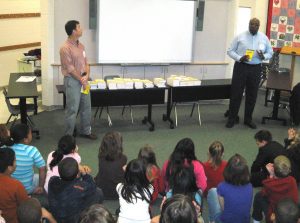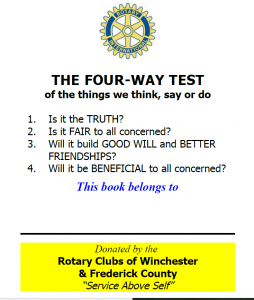Reading and use of Words are important tools for success in school and life.
Dictionaries are a key aid toward reaching that goal.
The Dictionary Project is an international program whose goal is to give a dictionary to every third grader in the US and other parts of the world. Many Rotary clubs, as well as many other organizations, participate in the project nationally and internationally. To date the Dictionary Project has provided some 30 million dictionaries to young students in the US and internationally.
The goal of the Dictionary Project is to have a positive impact on education in this country and abroad, to empower children to become skillful communicators and resourceful learners. Our country and our world face many challenges. We need to prepare our young people to be strong, smart, productive citizens who can succeed and grow and solve problems in a rapidly changing world.
A personal dictionary may be a small thing but it is a powerful tool to help with learning. As a gift from a child’s community, our contribution of a dictionary not only becomes a learning tool for the child but also creates the experience of how the community can serve student development. For many young students, this dictionary is the first book that they have ever owned as theirs alone. It is fun and satisfying to watch their excitement as we hand them their personal dictionary and ask them to write their name in it. “It’s not your mother’s dictionary, or your teacher’s dictionary, it’s YOUR dictionary!” we tell them.
Educators have determined that the 3rd grade is the best time to begin teaching young students how to use a dictionary. It is a key step in helping them to make the important transition between ‘learning to read’ to ‘reading to learn’. That’s the reason that the Dictionary Project focuses on giving dictionaries to 3rd graders, as well as making sure the dictionaries they receive are designed for younger readers.
Every year, during American Education Week, we hand out new dictionaries to every 3rd grade student in Winchester and Frederick County public and private schools.

Rotarians Dave Smith and John Tyson talk to students about the importance of dictionaries and why we give them to students to help them learn.
Rotary clubs began distributing dictionaries through the Dictionary Project in 2006. The Winchester Rotary Club received a Rotary district grant to get started and enlisted the help of the Frederick County Rotary club to help distribute dictionaries. Since that time, the two clubs purchase all the dictionaries and go to local elementary schools to distribute them. The clubs work closely with elementary education officers in the Winchester and Frederick County Public School Superintendents’ offices, as well as with principals at local public and private schools, to plan when, where, and how to make the presentation at each elementary school.
Each dictionary has a book marker on the inside cover, placed there by Winchester’s Handley Public Library staff, with a space for the student’s name, the Rotary wheel symbol, and the Four-Way Test.

Dictionary book marker has space for student’s name to make it their personal property.
As part of their presentation to students, Rotarians often talk about the meaning of the Four-Way Test with the students and use words in the Four-Way Test, such as “truth” and “friendship”, to help students practice their dictionary skills. We frequently get messages from parents and teachers telling us about their children’s enthusiasm about their personal dictionary and thanking us for the program. Also, teachers often use the opportunity to teach their young students how to write nice ‘thank you’ notes for the dictionaries, which the teachers then collect and send to us. We love that!
Since 2006 the Winchester Rotary Club and the Frederick County Rotary Club working together have distributed nearly 26,000 dictionaries to Winchester and Frederick County third grade students. During the most recent year, 2019, the clubs distributed 1,464 dictionaries to 19 elementary schools.
For more information about the Dictionary Project in the US and elsewhere in the world, go to https://www.dictionaryproject.org/about/ .